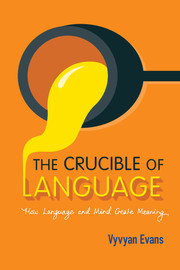Book contents
- Frontmatter
- Dedication
- Epigraph
- Contents
- List of figures
- List of tables
- Preface
- Acknowledgements
- I The ineffability of meaning
- Chapter 1 Unweaving a mystery
- Chapter 2 The alchemist, the crucible and the ineffability of meaning
- II Meaning in mind
- III Meaning in language
- Epilogue: The golden triangle
- Notes
- References
- Index
Chapter 2 - The alchemist, the crucible and the ineffability of meaning
from I - The ineffability of meaning
Published online by Cambridge University Press: 05 November 2015
- Frontmatter
- Dedication
- Epigraph
- Contents
- List of figures
- List of tables
- Preface
- Acknowledgements
- I The ineffability of meaning
- Chapter 1 Unweaving a mystery
- Chapter 2 The alchemist, the crucible and the ineffability of meaning
- II Meaning in mind
- III Meaning in language
- Epilogue: The golden triangle
- Notes
- References
- Index
Summary
Dr John Dee (1527–1608 or 1609), was renowned as one of the most learned men of Elizabethan England. While still in his twenties, he was invited to lecture on algebra at the University of Paris. He was a widely respected mathematician and astronomer. He was also one of the age's leading experts on navigation: he trained those who led many of the English voyages of discovery to the Americas. During his lifetime, he amassed one of the greatest personal libraries in all of England. Moreover, his intellectual prowess brought him into the orbit of the court of Elizabeth I, whom he served as scientific advisor.
But John Dee was also a scholar of the occult: his compass included the realms of both science and magic, in a time, before the Age of Enlightenment (1650–1800), when the two were still not clearly separated or distinguishable. Dee was an expert in the mysteries of alchemy – the pseudoscientific study of the essences of materials. His investigations drew on the mystical, such as Hermetic philosophy, which attempts to tap into cosmic consciousness, and primordial wisdom. And in his final years, his research increasingly focused on an attempt to commune with divine beings, including angels, seeking to uncover a universal ‘language of creation’.
For Dee, all his research endeavours nevertheless formed part of a coherent intellectual quest to uncover the divine forms that undergird and infuse the visible world of corporeal experience. Dee was, in an important sense, representative of a tradition of mediaeval scholars whose scholarly pursuits both presaged and led to the later development of scientific thought, theory and practice, based on observation rather than divination and the occult.
The ostensible goal of alchemy was the transmutation of material form into perfection. One example of this was the quest for the ‘philosopher's stone’, a substrate that would work on base materials, transmuting them, via a chemical process, into more noble metals, such as silver or gold. In terms of the human form, the search for an ‘elixir of life’ was meant to transmute the human body, providing youth and longevity. While alchemy dates back to antiquity, it was still widely practised during the mediaeval period, and even into the Enlightenment.
- Type
- Chapter
- Information
- The Crucible of LanguageHow Language and Mind Create Meaning, pp. 9 - 32Publisher: Cambridge University PressPrint publication year: 2015



